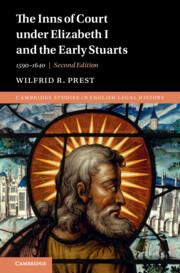Book contents
- The Inns of Court under Elizabeth I and the Early Stuarts
- Cambridge Studies in English Legal History
- The Inns of Court under Elizabeth I and the Early Stuarts
- Copyright page
- Contents
- Figures and Tables
- Preface to the First Edition
- Acknowledgements
- Abbreviations
- Introduction to the Second Edition
- 1 Dimensions
- 2 The Quality of Membership
- 3 Ranks of Membership
- 4 Administration and Government
- 5 Discipline and Disorder
- 6 Learning the Law
- 7 Legal and Liberal Education
- 8 Papists
- 9 Preachers, Puritans and the Religion of Lawyers
- 10 The Inns of Court and the English Revolution
- Book part
- Glossary
- Note: Archives and Manuscripts at the Inns of Court
- Index
3 - Ranks of Membership
Published online by Cambridge University Press: 15 January 2023
- The Inns of Court under Elizabeth I and the Early Stuarts
- Cambridge Studies in English Legal History
- The Inns of Court under Elizabeth I and the Early Stuarts
- Copyright page
- Contents
- Figures and Tables
- Preface to the First Edition
- Acknowledgements
- Abbreviations
- Introduction to the Second Edition
- 1 Dimensions
- 2 The Quality of Membership
- 3 Ranks of Membership
- 4 Administration and Government
- 5 Discipline and Disorder
- 6 Learning the Law
- 7 Legal and Liberal Education
- 8 Papists
- 9 Preachers, Puritans and the Religion of Lawyers
- 10 The Inns of Court and the English Revolution
- Book part
- Glossary
- Note: Archives and Manuscripts at the Inns of Court
- Index
Summary
Having examined the societies’ human dimensions, we may look more closely at their internal structure. As membership numbers grew, the intimacy of corporate life tended to weaken (‘From Clerks to Students’), while call to the bar, previously no more than an internal rank of membership, had become the necessary qualification for audience in the superior courts.‘The Rise of the Barristers’ and mounting pressure of numbers seeking call impelled the inns to prescribe formal qualifications, in terms of years of ‘continuance’ and participation in specified oral law-learning exercises. While non-academic factors, especially patronage and tenure of legal office, also played a part, use of the exercises to qualify for aa potentially lucrative legal career at the bar encouraged evasion or perfunctory performance. Meanwhile promotion to the governing bench of each society was no longer so intimately associated with the delivery of a ‘reading’ on a branch of statute law, and lawyer members who held major office under the crown or in the bureaucracy of the law courts were increasingly given automatic promotion as benchers or associates to the bench (‘From Readers to Benchers’).
- Type
- Chapter
- Information
- The Inns of Court under Elizabeth I and the Early Stuarts1590–1640, pp. 73 - 99Publisher: Cambridge University PressPrint publication year: 2023

